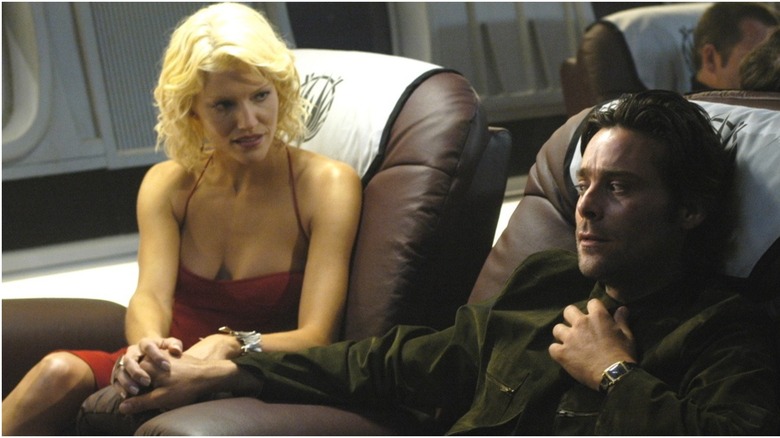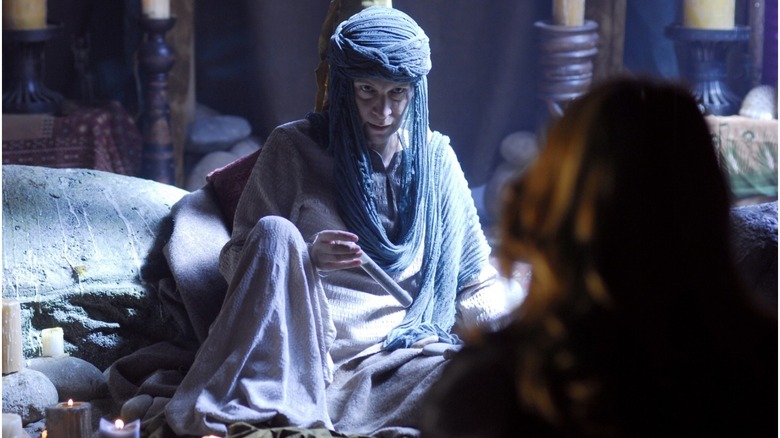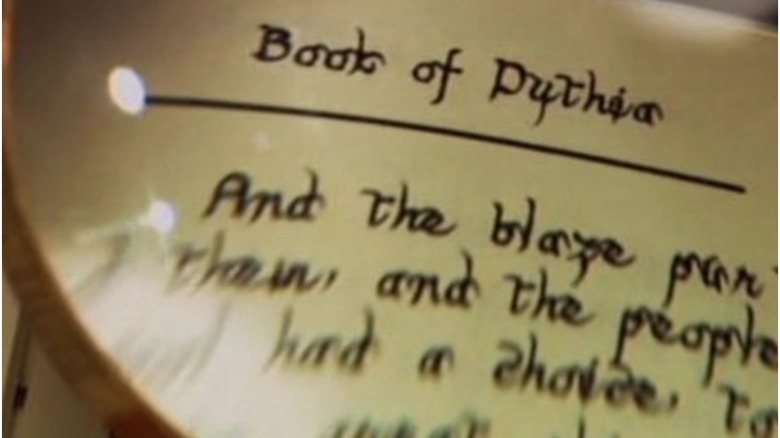A Simple Line From Number Six Brought Religion To Battlestar Galactica
Religion has always been integral to "Battlestar Galactica." Glen A. Larson, the creator of the original 1978 series, was a practicing Mormon and his faith influenced the series. For instance, Kobol, humanity's original home-world in "BSG," is an obvious anagram of Kolob, which Mormons believe to be a celestial body close to the throne of God. The concept of the 12 tribes of man also parallels the 12 tribes of Israel. Like the Israelites escaping bondage in Egypt, Galactica and her fleet are traveling in search of a promised home.
The reimagined "Battlestar Galactica" didn't have the same influence; it imported the Mormom-flavored concepts from the original series but didn't develop them further. Still, faith was undeniably still a big part of the reboot. According to co-creators Ron Moore and David Eick, it was all thanks to an off-the-cuff line.
Do androids worship an electric god?
The reimagined "Battlestar Galactica" is the defining sci-fi show of the aughts, and that was a time when religion was on America's mind. Post 9/11, Al Qaeda had become national enemy #1. Meanwhile, the "moral majority" [sic] once again had their chosen President in the White House. During an interview with Collider, Moore and Eick explained that SYFY executive Michael Jackson encouraged the religious themes in the show because they gave the show resonance. Yet, these themes happened almost by accident.
Moore recounted that when he was scripting the mini-series, he included a moment when Number Six (Tricia Helfer) tells Gaius Baltar (James Callis) that "God is Love." Moore said, "When I wrote it I didn't really know what it meant. But I thought it was an interesting thing for a robot to say."
However, this religious bent wound up being foundational to the series' reimagining of the Cylons. Later in the mini-series, Leoben Conoy aka Number Two (Callum Keith Rennie) muses that his kind might be God's retribution on mankind for their sins. While the Cylon religion is not an exact mirror of any of the three Abrahamic religions, their ability to "resurrect" (or download into new bodies) has a definite Christian bent.
The illusory Number Six who Baltar and only Baltar can see continues to whisper in his head that God has a plan for him. It's initially ambiguous if this "Head Six" is real or if Baltar is hallucinating. Her philosophical mutterings and portents could easily come from the mind of a man as riddled with delusions of grandeur as Baltar is. As the series progresses, though, it becomes clear that she is indeed real, and an agent of the one god who the Cylons worship.
Human polytheism vs Cylon monotheism
The show's human characters follow faith too, but a much different one than the Cylons. Unlike their monotheistic children, the humans in "BSG" adhere to Greek polytheism, with frequent references to Zeus, Athena, and their ilk. As Moore said in the aforementioned Collider interview, this conflict between different strains of faith was one of the most "fascinating blend of ideas" in the show for him.
As far as science-fiction goes, "Battlestar Galactica" is also rather respectful of religion. Cylons, Six, Two, and Three/D'Anna Biers (Lucy Lawless), all of whom are genuinely devout, pull collective heel turns in season 4. On the other hand, Number One aka John Cavill (Dean Stockwell) is both a nihilist who doesn't share the faith of his siblings and the main villain of the series. A turning point for Baltar becoming more sympathetic is when he begins leading a group of human monotheists in season 4. In "He That Believeth In Me," he prays sincerely, begging God to take his life over that of a sick child; this would've been unthinkable for the selfish and cowardly Gaius of season 1.
In the season 3 finale "Crossroads," Starbuck aka Kara Thrace (Katee Sackhoff), last seen perishing in "Maelstrom," returns from death. Over season 4, it becomes clear that God resurrected Kara so that she could lead the colonials to their new home on Earth. In short, God led humanity's savior to their death and then resurrected them so they could see their mission through. Sound familiar?
Moore told Collider that when he first got Jackson's notes, he thought, "I'm not going to get the note to have more religious content on the show very often." Considering how integral religion was to making "BSG" the show it became, the series' fans should be thankful that he did — this one certainly is.


